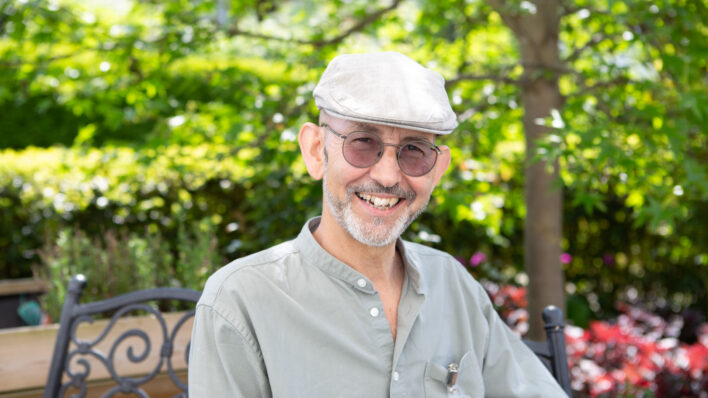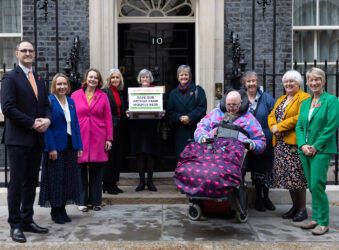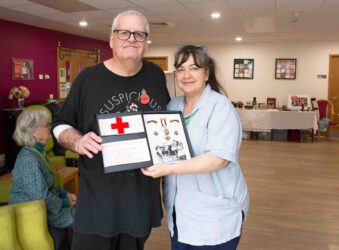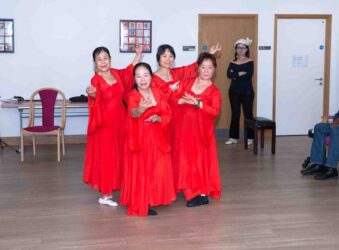Living Well Patients at the Hospice relax with Meditation
Share this story

David Lynch from The Mindful Green Coach, visited the Living Well Service at the Hospice in Cambridge to share some mindful meditation practices.
The session was called ‘Connect, Calm and Comfort’ where he shared basic practise with patients of how to give themselves timeout when they’re going through a difficult period, to check in with themselves, listen to what their mind and body’s telling them and to give it some space.
David shared:
“We’ve been practising mindfulness with the help of nature. What’s great about having the doors open [in the Living Well Lounge at the Hospice] is that you can listen to the birdsong which helps us to manage the stresses, anxiety and demands of life.”
He came to Cambridge twenty years ago to train in Buddhist ordination and learnt this new skill. He says:
“It saved my life. I’d spent my time seeing the world and I didn’t look after myself very well. So, I learned mindfulness meditation as a lifestyle choice. I find it a survival skill now and it’s why I do what I do as a livelihood and as a volunteer. I trained as a secular mindfulness teacher so my sessions have all the same concepts of the Buddhism training but I don’t make any reference to any religion so it is accessible to everyone as it doesn’t in any way contradict anyone’s faith or no faith.”
David shared his motivation for volunteering his services at the Hospice:
“I’ve got a particular fondness of the hospice movement generally because my sister died in her 30’s and spent her last two weeks in a hospice. She said it was the happiest time of her life. So, when I witnessed this model of care and kindness, it really touched me and I just love to give back now and that’s why I volunteer here.”
David shared that he got some great feedback from the patients about how, even after just a 5/10-minute meditation, they were able to let go, find some ease to any pain, discomfort and truth of their life-threatening illness. One patient shared that they had learnt to take 5-10 minutes in the morning after they’ve opened the curtains and said “I think that’s a really good idea, I think I’m going to try that”.
Another patient added:
“I thoroughly enjoyed it, I felt very relaxed and I felt like I was drifting which was lovely and I could hear the birds singing, which was very, very nice. I hadn’t tried meditation before but I’m going to have a go at home too now.”
David added:
“There was also some levity towards the end of the session because it was in a very safe space and people like to laugh. So, it’s a mixture of connecting with any sadness, anger, pain or difficulties living with the illness but also connecting with our shared humanity and supporting each other. It’s very meaningful and very moving.“
David also shared his thoughts on modern technology:
“It’s a duel-edged sword. On the one hand, because of our dependence on technology, sometimes it’s very difficult to get a sense of switching off and letting go and feeling like we can relax. But on the other hand, you can put mindfulness meditation in your search engine, and get a whole array of opportunities, whether it’s videos or guided meditation. When I trained years ago, that wasn’t the case, you had to come to a class.“
The Charity has a range of meditation videos on their website which can be accessed at arhc.org.uk/wellbeingvideos and also a new telephone service with recorded self help information and recorded meditation session which can be accessed by telephoning 03302 320162.
View other stories
-

Energy saving support for Hospice Patients
SCOPE visit the Living Well Service patients
-

Hospice patient, loved ones and supporters deliver 15,500 signatures
Lisa, Vivien, Valerie and Rick deliver 15,500 signature to Protect Our Care with local MP’s
-

Living Well Hospice Patients engage in memorabilia
As we approach Armistice Day Living Well patients reminisce
-

Chinese Community dancers and performers entertain patients at the Hospice
Chinese Community from both Cambridge and London perform at the Living Well Service



